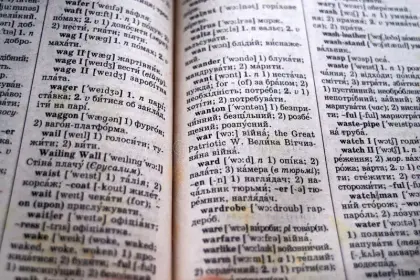What is the state of play with plans to boost knowledge of English in Ukraine?
The draft bill tabled in the Verkhovna Rada (Ukraine’s parliament) in June by President Volodymyr Zelensky defines English as the language of international communication in Ukraine. Considering the international community’s interest in Ukraine, its leadership is seeking to raise the level of Ukrainians’ command of English.
JOIN US ON TELEGRAM
Follow our coverage of the war on the @Kyivpost_official.
In a recent poll conducted by the Razumkov Center of Economic and Political Studies, a mere 1 percent of Ukrainian respondents claimed they were fluent in English, while 44 percent admitted they did not speak English at all.
The draft bill specifies the government agencies and industries in which the use of English is mandatory. Some of the proposed amendments to the draft bill have raised protests. One of them suggests removing Ukrainian dubbing from English-language films to be shown in Ukrainian theaters. Naturally, dubbing actors protested against the bill and demanded to withdraw this amendment. Their criticism seems to have been heeded.
Kyiv Post asked lawmaker Mykyta Poturayev, chairman of the Standing Committee on Humanitarian and Information Policy, what or who persuaded the lawmakers to withdraw this amendment and what his expectations are from this legislation.
How do you assess the draft bill on the use of English in Ukraine?
I assess it very positively, and not even as the committee chairman but as a philologist. My first qualification is “teacher of English Language and Literature.” I see it as the first attempt to improve the command of English and increase the number of Ukrainians speaking English. Of course, there’s no end to improvement.
![[VIDEOS] North Korean Troops in Russia Confirmed](https://static.kyivpost.com/storage/2024/10/19/a6f6a4c5d74d066019e5812a20c6514f.png?w=420&q=75&f=webp)
[VIDEOS] North Korean Troops in Russia Confirmed
I’m quite optimistic about this draft bill. I believe that if it’s properly implemented with sufficient resources, then in five years or so we’ll see qualitative changes and in 15 years we’ll have tangible results and see an entirely different English-speaking landscape. I think there will be more English-language films in our theaters, more books in English published here in Ukraine or imported.
As for English-language films in Ukrainian theaters, the current legislation sets a quota, allowing them to show 10 percent of films in the original language. At present, they manage 0.5 percent at best. If we look deeper and ask the distribution industry how many people come to watch such films, they answer that the house is filled at 20 percent of the capacity on the average. This shows us that there are rather few people wishing to watch films in English, because very few understand it well enough [even though original language films are shown with Ukrainian subtitles].
But in the future, we hope to overcome this bar. And then, of course, it would be good if the majority of Ukrainians spoke not only English but also one more EU language at least. I’ve been insisting from the start that in our schools we have every right to prioritize one or two languages. But as to the access to cultural projects, we can’t prioritize any language when we join the EU, where all languages are equal.
That’s why we can’t say it’s about creating conditions for showing films in English, because in the European Union English isn’t above German, French, Polish or Romanian. But if we really mean to give Ukrainians an opportunity to watch films in the original language, then the future law should say “original languages of EU member countries,” in order not to open loopholes to the language of the aggressor state or other states that are unfriendly to Ukraine.
As to the proposed requirement for cinemas, I understand that you heeded dubbing actors and others who make voice-overs and decided to withdraw it in order not to kill Ukrainian dubbing. Isn’t that so?
I said from the start that this bill wouldn’t kill Ukrainian dubbing, because dubbing would remain on TV, even though there would be some negative effects. Dubbing studios wouldn’t go broke and the people who produce Ukrainian dubbing wouldn’t have to look for other jobs because there is television, which is a major customer, and there are also streaming services.
But the fact is that in recent years major companies, such as Warner Bros., 20th Century Fox and others have financed Ukrainian dubbing of their films because they are interested in viewership growth. And if Ukraine gave them this signal now, meaning we are going to gradually abandon dubbing, then they would, as pragmatic people, begin to taper these funding programs.
This bill was initiated by the President. Did he object to withdrawing the dubbing amendment?
The President is a very intelligent man and he wants Ukrainians to have a better command of English.
Should English be a second state language in Ukraine?
Look, we’re not Singapore [where English is one of the state languages]. We are in an absolutely different cultural-political situation, cultural-political context. We have one state language and it is Ukrainian. But it is necessary to learn and speak other languages. The more languages you speak the more access you have to other cultures.
When do you expect this bill to be considered and passed?
At the nearest plenary meeting it will undergo the first reading, and I think we’ll have it adopted by the end of this summer.
You can also highlight the text and press Ctrl + Enter






